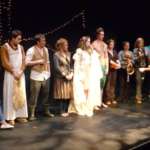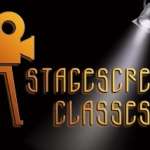Do you love live performances? Are you obsessed with Hamilton and know all the dialogue from Wicked verbatim? Well, you are in for a treat, as here on Nightcourses.com, we got the opportunity to sit down with performer Niamh Andrews Fraher and chat about what makes great musical theatre.
Niamh studied Theatre performance at Inchicore College until 2011. She has received the Trinity Guildhall Associate Diploma in Musical Theatre and Drama as well as undertaking the 6-Month Part Time Screen Acting Course in Bow Street in 2017. She has worked extensively across the theatre and film world.
What’s your own background, when it comes to performance?
I always had a love of performance from a young age. Be it singing in a youth group or doing hip hop dancing with a great teacher called Don King. It wasn’t till 2008 after seeing Disney’s Beauty and the Beast in the Olympia that I decided this is what I want to do for the rest of my life. So I auditioned for Inchicore College’s performance course. I got my place and promptly quit my full time job much to my family’s dismay.
You need a thick skin and a real drive in this industry. It’s hard to find paying work. If someone is determined to enter this industry I would advise them to get themselves on a course of some kind. We’ve some amazing teachers in this country. Join a local theatre group, get on the set of some student films. These are great ways to meet new people and make connections.
What are typical common mistakes people make when they are starting off with musical theatre?
There are several common mistakes that are generally made by new actors. They tend to turn
their back to the audience or tend to act with just their voice instead of engaging their whole body. The most common mistake I’ve come across is performers apologising to the audience, the director, and their fellow cast mates. Never apologise. You own this. Some of the greatest moments are created by accident. Seize them.
Acting-wise, who’s your inspiration?
There are a lot of amazing actors out there. Personally, I love the quirkiness of Johnny Depp and Helena Bonham Carter. I am in awe of the great actors such as Ian McKellen and Maggie Smith too.
You have experience with combat skills, and dancing – how important is movement and physicality when it comes to expression and delivering a strong performance?
Your physicality is so important. How you hold yourself defines your character. Your walk, your posture: it’s all central to your character development. Are you a regal queen or a sneaky villain? Your physicality tells your audience this before you say a word.
What do you think are the main differences between acting for stage and screen?
They are such different disciplines. Each creates their own kind of magic. In theatre, you can be big and boisterous with the luxury of being able to use your entire body. On screen, you have to tell the audience everything through just your voice, eyes and facial expressions. If you move around too much, it’s distracting. Both have advantages and disadvantages.
I see you were involved in the ‘Hello Au Revoir’ project. Can you tell me a little about that?
The feature film ‘Hello Au Revoir’ was a bit surreal for me. The actors never met. Over 1,000 actors were involved. Every individual worked on, and were edited into, this one feature. It’s fascinating really!
You worked on quite a few Pantos, what, do you notice, would be the difference between these and ‘classic’ theatre? I can imagine they can be quite grueling and physical!
Panto is great but hard work. I’ve had the good luck to play several stock characters including the Principal Girl and the Villain. Each character has their own distinct, recognisable characteristics. Very like Commedia Dell’arte. The biggest difference I’ve found between panto and classical theatre is with the audience. In classical theatre the audience watches as you tell the story; in panto, the audience is part of the story. Audience interaction brings panto to a different level. I love both, but nothing quite
compares to a little girl’s joy meeting Cinderella and the awe on their face as they hand you a picture they coloured just for you. Now that is magical.
Waking the Feminists was a huge recent movement in Irish theatre, as a professional working in the area, what differences have you noticed?
Waking the Feminists was long overdue, I believe. There are so few female lead roles in theatre. I’m glad that there has been some improvement, especially in the larger theatres like the Gate and the Abbey. There’s still work to be done but we’re heading in the right direction.
When it comes to genre, with regards screen and stage – which is your favourite?
Both screen and stage are amazing in their own ways. For me there is nothing quite like the feeling before you step on to the stage in front of a live audience. The excitement, the nerves it’s a wonderful feeling.
Musical theatre has made a big resurgence with mainstream culture in the past few years. What do you think makes a great musical?
I’m glad to see the musical make a comeback. To make a musical great, you need a captivating storyline, memorable songs and a great cast. Cast is central. For example my favourite musical is ‘The Phantom of the Opera’. I’ve seen it twice – once in the Bord Gais, and once on the West End. I was so disappointed with the West End production. The phantom was such a let-down that it ruined the experience.
You often hear about ‘divas’, be them male or female, when it comes to the creative arts. Is it important to be professional on stage/set?
Professionalism is key in this industry. There are so many egos to deal with. Ego is not always a bad thing. It’s essential really, but there’s a fine line where ego becomes arrogance. It ruins everyone’s experience in a production. Everyone is talented, you all got the job. Work as a team and support each other. Then everyone leaves with fond memories.
Thanks for chatting with us!
Niamh is presently teaching on a specialised musical theatre class for adults with StageScreen Classes which starts 4th October 2019. This is an exciting and challenging course designed and run by theatre/film director Conor Armstrong Sanfey. Over the two terms, students will learn tips to help them improvise, act, sing and dance in a comfortable safe environment
With regards singing, you’ll be covering the great composers – Lloyd Webber, Sondheim, Rodgers and Hammerstein. This will be teamed with classes on movement and choreography. Exercises to strengthen your voice, help with breathing and assisting you to find range will be given on a weekly basis. In acting, you will focus on improvisation, characterisation and stage presence.
The course will build towards a performance showcase in the Sean O’Casey Theatre. Find out more about this programme here.

















